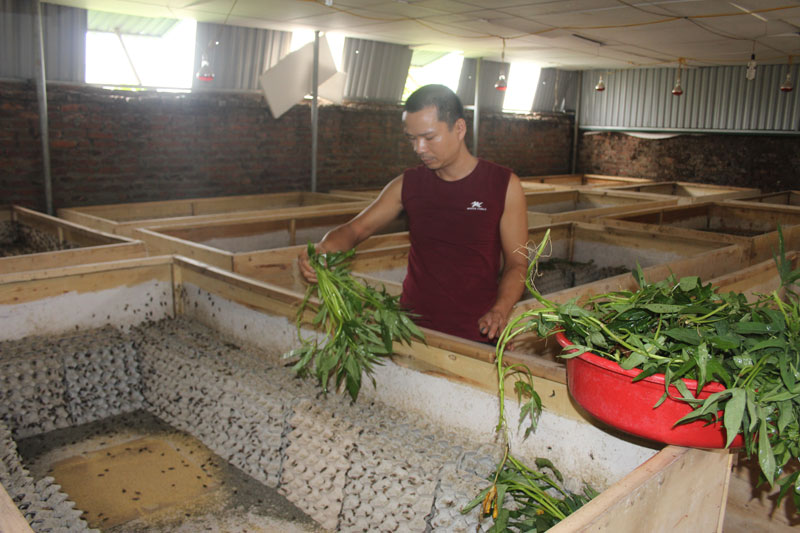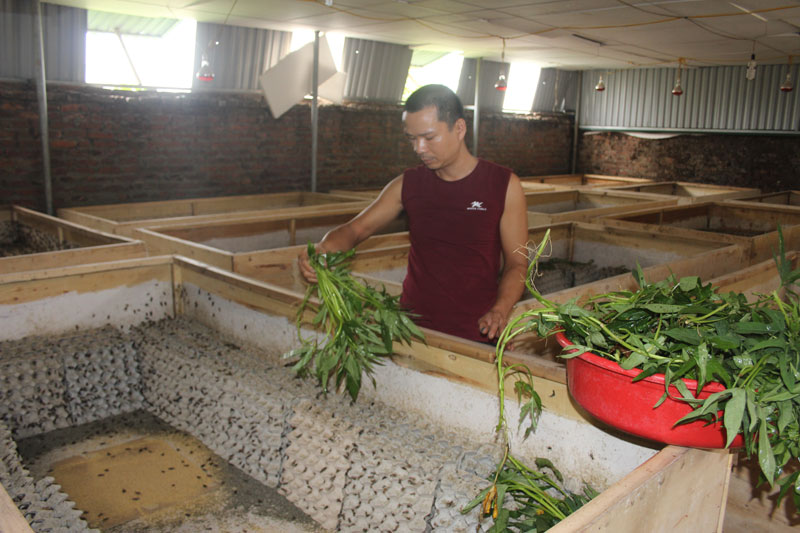
(HBO) – Everyone in Thanh Nong commune of Lac Thuy district compliments Nguyen The Hung, also called "Hung Crickets", in Vai village, on his idea of raising insects to get rich.
While many
local people have actively invested their money into growing fruit trees like
orange and pomelo, Hung in Vai village, had another idea, breeding insects. "My
main job is repairing motorbikes, but it has been very competitive as many new
shops opened. When I don’t have clients, I like to learn about different
species of insects on the Internet”, Hung said.
"It does not take too much space for an insect farm
and only requires little investment, so I decided to try this new business and
take advantage of the vacant space behind the house”, he explained. "At first,
my family did not like my idea very much when I discussed it with them because
they had doubt that cricket is only an insect and whether there is a market for
it. But I still determined to invest in the insect.”

Nguyen The Hung from Vai
village, Thanh Nong commune, Lac Thuy district is taking care of his crickets.
Hung spent about 40 million VND purchasing crickets
from Thanh Tam Company, a breeder in Thuong Tien district, Hanoi and built his
farm with 15 cages made of pressed wood in September last year.
"Crickets are very easy to raise; and the work only
requires you to be hardworking and loving the insect”, Hung said. "You need to
clean the cages every 5-7 days and keep the temperature of the cages at around 25-30oC
for the crickets to develop well.”
According to Hung, crickets do not consume much food;
they mainly eat water spinach, sweet potato leaves and rice bran for chicken.
Crickets grow fast; it only takes 9 days for their eggs to hatch and 35 days
from then until they are ready to be sold. However, their development also
depends on the weather; they can develop well between the third and tenth month
of the lunar calendar.
His
originality and bravery have finally paid off. Neither his family members nor
neighbors have expected his business to be successful and bring him big money.
Each cage yielded about
20 kgof crickets that fetched at 200,000 – 300,000 VND per kg. Most of his crickets
have been bought by Thanh Tam while the remaining was sold to local
restaurants. Hung earned a profit of 80 million VND after a year. He plans to
expand his farm to ten more cages in this October.
Hung’s originality and adventure idea are admired by
people in the commune. Many have come to him to learn from his experience,
including his neighbor in the village, Dang Van Thanh, who now has his own
cricket farm./.
According to data from the Hoa Binh Provincial Party Committee, the industrial production index for the first six months of 2025 is estimated to have increased by 20% compared to the same period last year. This marks the highest year-on-year growth rate for this period since 2020.
In the first six months of 2025, Hoa Binh province’s export turnover was estimated at 1.145 billion USD, marking an 18.11% increase compared to the same period in 2024. Import turnover was estimated at $ 804 million, a 17.15% increase, which helped the province maintain a positive trade balance.
The lives of the ethnic minority farmers in Tan Lac district have gradually improved thanks to the new directions in agricultural production. This is a testament to the collective strength fostered through the professional associations and groups implemented by various levels of the district’s Farmers’ Union.
With the motto the "product quality comes first,” after nearly one year of establishment and operation, Muong village’s Clean Food Agricultural and Commercial Cooperative, located in Cau Hamlet, Hung Son Commune (Kim Boi district), has launched reputable, high-quality agricultural products to the market that are well-received by consumers. The products such as Muong village’s pork sausage, salt-cured chicken, and salt-cured pork hocks have gradually carved out a place in the market and they are on the path to obtaining the OCOP certification.
In the past, the phrase "bumper harvest, rock-bottom prices" was a familiar refrain for Vietnamese farmers engaged in fragmented, small-scale agriculture. But today, a new spirit is emerging across rural areas of Hoa Binh province - one of collaboration, organisation, and collective economic models that provide a stable foundation for production.
Maintaining growing area codes and packing facility codes in accordance with regulations is a mandatory requirement for agricultural products to be eligible for export. Recently, the Department of Agriculture and Environment of Hoa Binh province has intensified technical supervision of designated farming areas and packing facilities to safeguard the "green passport" that enables its products to access international markets.



